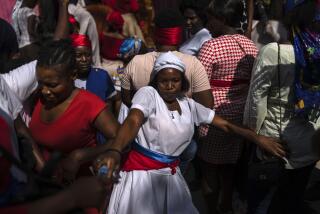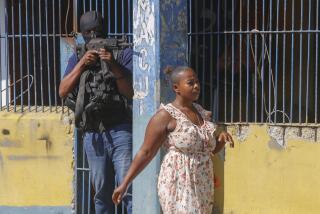Is There Life After Baby Doc?
- Share via
After almost 30 years of repression and corruption, the people of Haiti have taken to the streets in a spontaneous uprising against President-for-Life Jean Claude Duvalier. The Reagan Administration has wisely begun to distance itself from Duvalier, and should be prepared to offer assistance to any government that replaces the dictator if he flees.
Haiti has not had a genuinely democratic government since it won independence from France in the aftermath of an 1804 slave revolt. Its government has been relatively stable since 1957 only because it has been brutally controlled by the Duvaliers, first Francois, the infamous “Papa Doc” who ruled with the help of voodoo gangsters popularly known as Tontons Macoutes, and now his son. The younger Duvalier has tried to present a more benign image than his father, sending his political opponents into exile rather than killing them, and somewhat restraining his state police. But the people of Haiti have not been fooled. They refer to Jean Claude as “Baby Doc,” and still call the police Tontons Macoutes.
During their reign, the Duvaliers have treated Haiti more like a personal fiefdom than a nation. In corrupt alliance with a relative handful of wealthy Haitian families they control most of the country’s resources while the overwhelming majority of its people are illiterate and desperately underfed. The Duvaliers have amassed a fortune of hundreds of millions of dollars, but more than 75% of Haiti’s people live on less than $150 per year, making it the poorest nation in the Western Hemisphere.
U.S. governments as far back as President John F. Kennedy have looked for alternative to the Duvaliers, but their dictatorship has been so ruthlessly efficient in suppressing organized opposition that virtually none exists. The only alternative most analysts see to the present Haitian government is a military junta. Because Haiti’s U.S.-trained army has not been active in putting down the protests and riots that have disrupted a half dozen Haitian cities since November, it commands more popular support than the security police. Working with capable Haitian civilians--and there are many in exile as well as in Haiti’s business and academic communities--it could conceivably form a government that will have the support of the people.
There is a danger, of course, that Duvalier’s abdication could lead to chaos in Haiti. The army is outnumbered almost 2-to-1 by a militia controlled by the Tontons Macoutes. Should the army and militia begin to fight each other, it might be necessary for the Organization of American States to intervene with an peacekeeping force to maintain order until democratic Haitian leaders can organize a more representative and humane government than Haiti has known under the Duvaliers. It would be prudent for both the OAS and the Reagan Administration to be prepared to help Haiti through this difficult period in whatever way they can. Once Duvalier is gone, the future for Haiti--no matter how uncertain it may seem now--can only be better.
More to Read
Sign up for Essential California
The most important California stories and recommendations in your inbox every morning.
You may occasionally receive promotional content from the Los Angeles Times.










